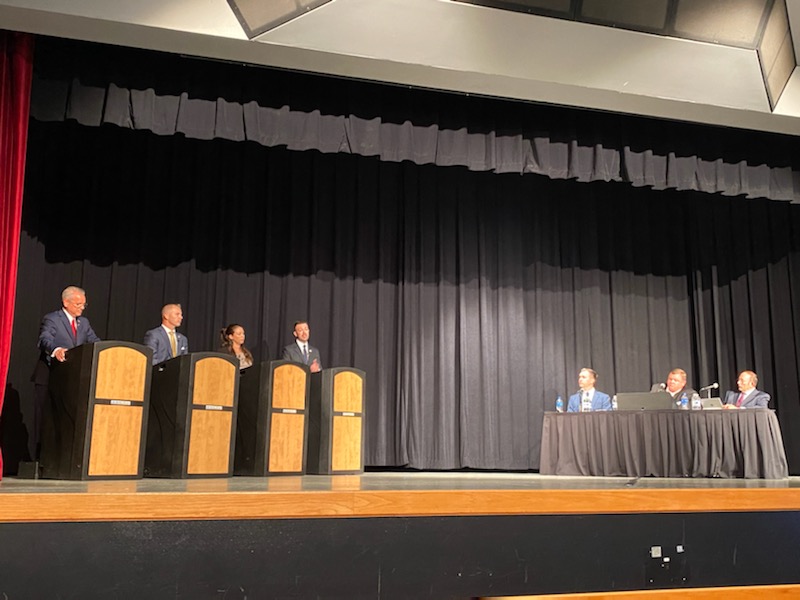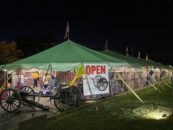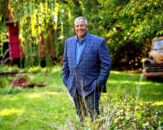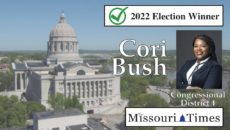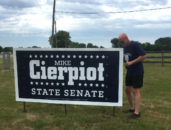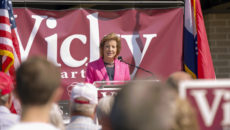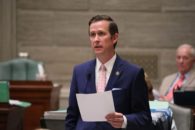Warrensburg, Mo. — On Thursday afternoon, four candidates running in the Republican primary for Congressional District (CD) 4 took to the stage at the University of Central Missouri’s Warrensburg campus. The four candidates are hoping to replace Rep. Vicky Hartzler in the U.S. House of Representatives.
Taylor Burks, Kalena Bruce, state Sen. Rick Brattin, R-Cass County, and Mark Alford all took stances on several important issues throughout the debate.
The first issue the candidates debated centered around illegal immigration and inflation. Moderator Austin Petersen asked the candidates if they would support supplying jobs to immigrants if it meant inflation going down.
Brattin took a strong stance on spending, viewing inflation as a problem to fix with budgeting instead of immigration programs.
“It has nothing to do with the wave of immigrants coming here illegally and has everything to do with a reckless out-of-control government that is spending money — not budgeting,” Brattin said of the inflation problem. “I think that the move needs to be looking at our spending and our budgeting. We’re at $30 trillion in debt, I hardly think an influx and pouring in of illegal immigrants into our nation is the answer.”
Bruce acknowledged the support to the workforce that migrants and immigrants can provide, advocating for Congress to make it easier for those workers to achieve citizenship and to be able to work with less red tape.
“Congress, farmers, ranchers, manufacturers, we need a reliable workforce. We need the migrant workforce that is used to doing those jobs, because there are a lot of those jobs that Americans simply don’t want to do,” Bruce said. “We need folks that have been in our country for generations, they need a path to citizenship.”
“But at the end of the day, we have to close the borders… we have to cut back our spending. It’s a two-pronged question. But there’s not going to be one answer to fix the inflation issue. But I do believe immigration reform has to happen,” she added.
Burks chose to focus on inflation instead of immigration. Highlighting his strong belief in fiscal conservatism.
“I’m the only candidate on the stage who hasn’t taken federal handouts that kicked off the inflation that we’re seeing, when we saw trillions of dollars spent in PPP and government handouts over the last three years,” Burks said. “You need a congressman who’s gonna go to Washington, DC, and fight for fiscal conservatism.”
Bruce was quick to rebuttal Burks’ point about government handouts, believing that the assistance the federal government provided to small businesses during the pandemic was a necessity.
“I think that that program was essential. And making sure small businesses — specifically in rural America — could stay afloat when our government, specifically the Biden administration, shut us down,” she said.
Alford took a strong stance against illegal immigration, putting the completion of former President Donald Trump’s border wall as one of his main priorities.
“Ladies and gentlemen, there is a crisis at the border, and television does not portray it adequately,” Alford said. “We’ve got to finish President Trump’s wall. We must deport illegal aliens. We have enough jobs here in America for Americans to fill.”
Another issue that garnered some insightful debate came from a question by moderator Mike Mahoney. Mahoney asked the candidates how they would balance their concerns about Chinese-American tension with the fact that China supports a large part of Missouri’s economy.
Alford focused on building jobs domestically, allowing both Missouri and America to be less reliant on China.
“We’ve got to build more jobs here in Missouri and in the United States, where we are not importing things from China,” Alford said. “They’ve (China) slowly crept their way into each and every one of our homes, into your phones, and into your televisions with a grip that we have not seen before … there is a power in that economic grip, we have to break that grip.”
Brattin support a Trump-esque “strong arm” approach to Chinese-American relations.
“We have to realize, yes, we depend on them, but they also depend on us so much more heavily. And having that strong arm approach, I think just like Trump did really put them (China) back on their heels,” Brattin said. “We keep selling them our debt, we keep doing these things that put us at a competitive disadvantage. We also have to look at the human rights that they continually violate, I mean, they literally have slave labor over in China.”
Bruce took her focus to manufacturing and tax policy.
“What we have to do is bring more manufacturing right here in Missouri, we are set up perfectly here in Missouri, we have the infrastructure to support it, we have the waterways, we have the rail, and we are set up to have some of the strongest manufacturing right here at home in Missouri,” Bruce said.
“We need to be using and bringing more manufacturing here at home. And doing so by strong fiscal policy … We have to be able to provide businesses competitive playing field so that they will quit exporting things to China,” she added.
Burks believes that China is America’s most dangerous foreign threat, and wants to bring the focus back to the states.
“This is a serious foreign policy issue because the most serious threat that this country faces overseas is China. The United States military has conflict with China in our strategic defense policy in the next five years,” Burks said.
“When we’re looking at conflict, whether its economic or actual military conflict with China, our concern is going to be — what is our manufacturing or production capacity? How are we going to compete with a country where we’ve built their infrastructure? We need to focus on this country and being prepared for when that conflict occurs with China,” he added.
The last question the candidates debated on came from moderator Scott Faughn. Faughn asked the candidates what they would do to give Missourians relief from high gas prices.
All four candidates put a focus on domestic energy independence.
Brattin focused on pushing the Biden administration, believing that a “red wave” will take over Congress come November.
“I think we’ve got to push on him to enact energy independence, to start that the drawback of what’s occurred to making gas go up to five bucks a gallon. I think that’s what we have to show that we’re willing to take it on and fight that fight,” Brattin said. “You’ve got to work with people to ensure you have the best and most fiscally sound America-centric policy — like pipelines and drill here drill now that sort of thing.”
Bruce focused on opening up the Keystone XL pipeline, which President Biden closed down at the beginning of his administration. She also characteristically focused on farmers and ranchers.
“We’ve got to be energy independent, this failed policy that we’re having shoved down our throats right now is obviously not working,” Bruce said. “We’re going to need all types of energy to continue on and be a strong America with the prices that Americans can afford.”
“Farmers and ranchers can be a big part of that, we have lots of research and lots of development in the biofuel space. And that’s going to be an important part of making sure we have clean affordable energy for the American people,” she added.
Both Burks and Alford put their focus on the Environment Protection Agency (EPA) and how the EPA’s regulation can harm domestic energy independence.
Burks zeroed in on administration inconsistencies and how they harm America’s oil production.
“Our energy companies are not going to invest in domestic production for this country. So long as every two years with a new Congress, or every four years with a new president, they’re threatened with shutdowns for our domestic production,” Burks said.
“We have to be an all of the above energy policy. And every time we flip the switch with a new Congress or new administration and start back at zero, it makes the United States weaker and drives up our prices at the pump.”
Alford aimed his crosshairs squarely at the Biden administration with his response.
“The F-150 is a model of a truck and it shouldn’t be what it costs to fill it up,” Alford said. “This is not the fault of President Trump. It’s not the fault of anyone but President Biden. I feel President Biden — the first thing he did was to demonize fossil fuels and continue his march towards trying to get in line with the crazy wacky climate change people.”
“He put the onus on and really targeted the fossil fuel industry, but he put the crosshairs on the backs of families like yours and farmers who are struggling.”
The debate, which was hosted by the Missouri Times, will be aired Sunday at 5 p.m. on KMOS, mid-Missouri’s PBS station. Kansas City’s PBS station will air the debate on Sunday at 11:30 a.m.
The full debate can be viewed here.
Featured Image: From left to right, Mark Alford, state Sen. Rick Brattin, R-Cass County, Kalena Bruce and Taylor Burks attend a debate hosted by the Missouri Times in Warrensburg, Mo. on July 15. (Brady Hays/The Missouri Times)
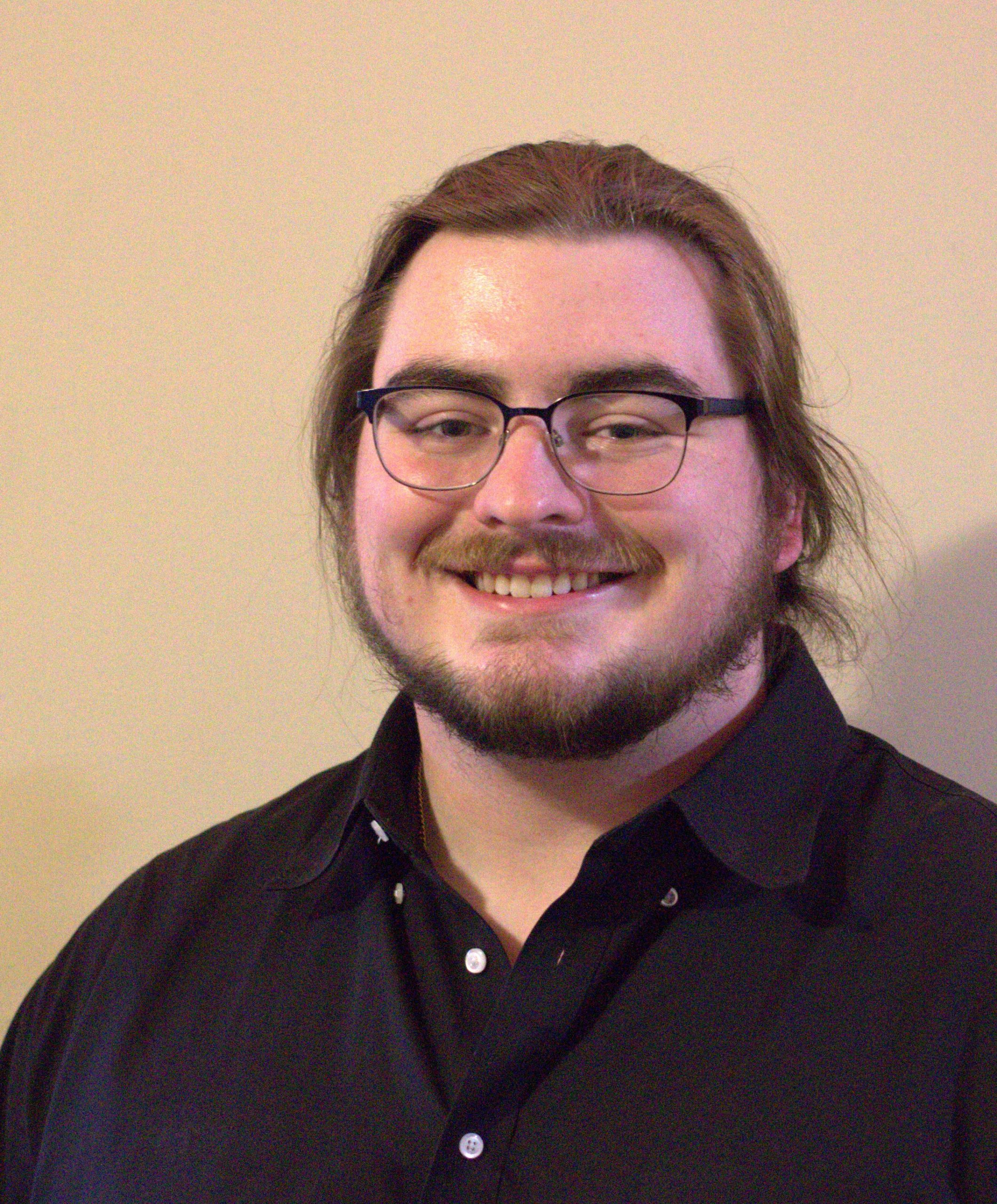
I’m a journalist hailing from the Detroit area. I love to tell investigative stories with a focus on everyday people.
You can contact me by email at matthew@missouritimes.com

